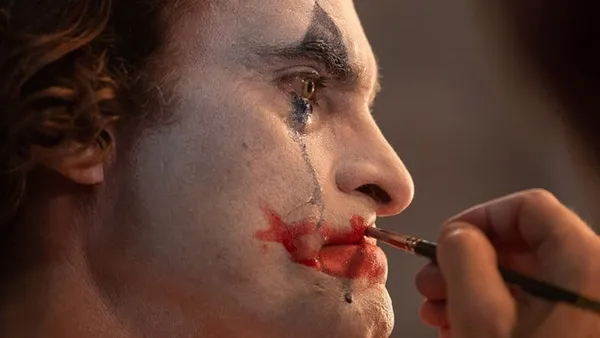 |
| Joker won over audiences in Venice Photo: Courtesy of NYFF |
The Venice Film Festival has suffered much worse years than this, but it does raise questions as to how this venerable event manages to survive controversies that would dominate the news cycle from Cannes. This year the festival opened with its weakest curtain-raiser in a long, long time, followed it with a male-dominated line-up that included two films by directors whose careers have been shrouded later by #MeToo controversy (more on them later), and platformed two major Hollywood studio movies seemed to wallow in male neurosis.
Expectations weren’t exactly high for day one, which wasn’t packed. First up was Hirokazu Kore-eda’s The Truth, a French-language soufflé that seemed to polarise audiences, but not by much. The kindest thing would be to say that it is slight; Catherine Deneuve stars as French movie star Fabienne, whose autobiography (which gives the film its title) has just been published. Her screenwriter daughter (Juliette Binoche) has come to visit fro the US, bringing her actor partner (Ethan Hawke) and their little daughter. During their stay, they visit Fabienne as she makes a bizarre sci-fi movie, playing the daughter of a woman who never ages. Family tensions are aired, but this is Kore-eda in bittersweet Our Little Sister mode, so nothing really escalates, sadly, and this is destined to be a minor curio in the filmographies of everyone concerned.
A lot more satisfying after that was Dominik Moll’s Only The Animals, a sprawling but surprisingly compact little thriller that starts in a village in Africa and somehow leads to a murder in rustic France. Constantly revealing and surprising, it keeps its Memento-like mystery going until the somewhat overheated end, with a credible cast that includes Denis Ménochet and Valeri Bruni Tedeschi. Olivier Assayas usually does this kind of thing equally well, but his competition entry Wasp Network didn’t impress at all, being a starry, soapy spy story, in which the likes of Gael Garcia Bernal, Pénélope Cruz and Edgar Ramirez play a team of Cuban emigrants who defect to America with a hidden agenda. There are flashes of greatness, but it feels hurried and unfocused.
The competition also brought two big star vehicles – James Gray’s Ad Astra and Todd Phlllips’ Joker. Normally you’d bet on Brad Pitt to bring the circus, but the films two press screenings passed without incident. Maybe all the publicity for Quentin Tarantino’s Once Upon A Time… In Hollywood made him seem suddenly less exotic, but there wasn’t the usual excitement, perhaps because Ad Astra is a very solemn space opera that, though fitfully exciting, prefers to ponder on its lead character’s insecurities as he heads off to Mars to make contact with his long-lost father (Tommy Lee Jones), who has gone rogue on an earlier mission.
Audiences instead went nuts for Joker, a great New York neo-noir more directly modelled on early Scorsese than anything else DC comics has lent its name to. Joaquin Phoenix near blew the roof off the Sala Grande with his brilliant performance as Arthur Fleck, a mentally fragile, zero-hours clown-for hire who dreams of becoming a stand-up on The Murray Franklin Show. That Murray Franklin is played by Robert De Niro should tell you all you need to know; this is King Of Comedy through the looking glass, for once a dark and gritty comic-book movie that actually IS dark and gritty. Its moral ambiguities went down a treat, save for a little bit of pearl-clutching from those who presumably wouldn’t have wanted their gardeners to read Lady Chatterley’s Lover.
 |
| Meryl Streep in Steven Soderberg's The Laundromat Photo: Courtesy of San Sebastian Film Festival |
Still, there were other things to get uptight about. Roman Polanski, always good for a headline, came to the Lido by proxy with J’Accuse (AKA An Officer And A Spy), a fusty period piece telling the story of France’s interminably boring Dreyfus Affair. Lots of famous French actors wear wigs and prosthetics, perhaps to avoid detection, and Polanski’s usually flair is similarly unrecognisable. Still, many liked it, even though its conceit – an innocent man is horribly wronged by a miscarriage of justice – isn’t really going to win the director any new admirers at this late stage. Similarly, American Skin, the new film from Nate Parker, whose Sundance breakout The Birth Of A Nation was torpedoed by a long-dormant claim of sexual assault, didn’t exactly turn the tide. Casting himself as the father of a teenage boy shot by the police might have seemed like an worthwhile Black Lives Matter statement back at home, but here it simply seemed self-serving, in a story that has been told before, and more artfully, in these dark, divisive times.
The festival’s tendency to let just anybody into their P&I screenings is a nice idea, but at times it backfires, such as the time there was no warning as to the content of The Painted Bird, a harrowing continuation on Elem Kilmov’s horrors-of-war film Come And See. Those drawn in by a cast including Willem Dafoe and Harvey Keitel were shocked by its cruelties, and even those who admired its austerity wondered if its over-ambitious 2hr 49 running time ran the risk of diluting its borderline nihilistic message. Mind you, Steven Soderbergh’s comparatively jaunty serio-comic doc The Laundromat fared from the opposite problem; many switched off from its whimsical sub-The Big Short stylings, using the likes of Meryl Streep, Antonio Banderas and Gary Oldman in weak, sketchy stories that illustrate the ethical issues raised by the release of The Panama Papers.
At time of writing, the competition was still wide open, although it’s unlikely that Venice favourite Roy Anderssons’s much-hyped About Endlessness, which felt like deleted scenes from his Golden Lion winner A Pigeon Sat On A Branch Reflecting On Existence, will bring the director a second win. In terms of word of mouth, the only real buzz title was Pablo Larrain’s Ema, ostensibly a punk-rock return to form after the weirdly unaffecting Jackie, with Natalie Portman. Ema is out there from the get-go, with newcomer Mariana Di Girolamo as the scheming, flamethrower-wielding nymphet title character. The film’s opening weirdness made it slow to appreciate, but by the end Larrain had the audience in the palm of his hand. Whether the jury, led by Lucrecia Martel, will go for it is one thing, but its originality in an otherwise fairly unremarkable year is quite another. Cannes, so often seen to trail Venice, certainly dodged some bullets here…





















